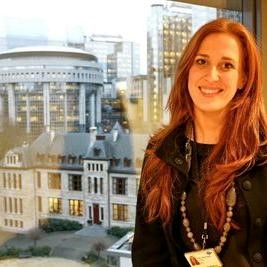2 July 2021
Hearing of Ginevra Del Vecchio, Communication Manager at the European Committee of the Regions

Ginevra Del Vecchio was a member of the European Youth Convention in 2001 and of the subsequent Italian Convention. Over her 20 years of experience as a communication and campaign manager, she has promoted hundreds of participatory events, such as forums and conventions on the future of Europe on a regional and local basis.
She is currently coordinator of the "European Week of Regions and Cities" at the European Committee of the Regions (CoR) in Brussels, a benchmark event dedicated to cohesion policies. Since 2016 she has been in charge of the CoR's Future of Europe campaign and the organisation of local events and "dialogues with citizens" in EU Member States involving, within partnerships, some CoR members, regions, cities, their national associations and other European institutions and their national offices (European Commission Representation Offices – REPs and European Parliament – EPIO and Europe Direct information centres).
Between 2004 and 2012 she held the positions of Director of Europe Direct Caserta, Head of TECLA Europe Brussels Office, and coordinator of joint ANCI-UPI Europe activities.
She defines herself as a European enthusiast and a connecter with strong propensity for networking and experimenting with new projects.
Hearing summary
The hearing of Ginevra del Vecchio took place today. The meeting highlighted the Conference on the Future of Europe does not have – like the European Convention in 2001 – a constituent mandate and is not called upon to draw up a draft reform of the treaties; yet it is hoped it can lead to such an outcome.
Europe needs to write the post-pandemic agenda by rewriting, on the one hand, a new narrative capable of rediscovering the new generations’ reasons for belonging to the EU project, today as in 2001 (Erasmus generation > digital generation experiencing an unprecedented sense of precariousness), and implementing a process of new legitimisation of the European project through widespread and structured involvement of citizens and youth.
In this sense, the Conference represents the broadest listening exercise ever launched by European institutions, implementing a model of participatory and deliberative democracy in which citizens are seated at the table together with political decision makers, determining the agenda and guiding the working groups. It accomplishes the virtuous process of public debate on the future of Europe launched in Member Countries in 2015 by the European Commission and the European Committee of the Regions through the "dialogues with citizens", which raised thousands of feedbacks on thematic priorities, main concerns and proposals for the future of Europe.
There is now great expectation as to the method and substantive proposals that will emerge, primarily on some crucial points that were already discussed in 2001, such as policies and decision-making mechanisms (simplification, unanimous decision making, fiscal policy, economic governance) that are currently absent from the agenda and have been only partly addressed by the downward renegotiation of the draft European Constitution by the government in 2001.
The very credibility of this democracy exercise and the accountability of the European system will be measured by the concrete follow-up that EU institutions, in particular, will give to the proposals that have so far emerged.
In conclusion, it is hoped that, at national level too, the experience of the Conference will not remain isolated, but will continue with as many regional and local conferences able to fuel permanent structured dialogue with citizens. This is precisely the basis of the Conference method, as also referred to in the conclusions of the 2017 European Council. From this point of view, Europe's 240 regions, its 90,000 mayors, the European Committee of the Regions with its network of EU councillors (the aim is to reach 1 million), YEPs (Young Elected Politicians) are undoubtedly a key network and strategic partners, as they are the level closest to the citizens.
